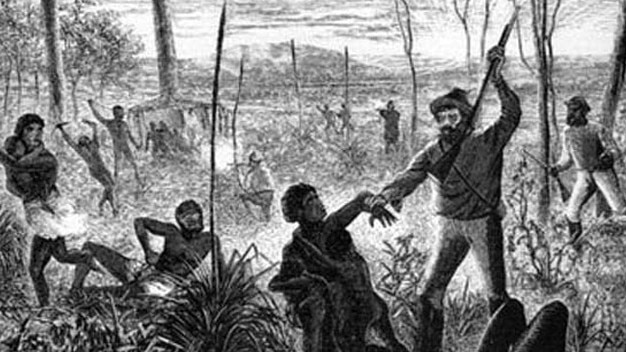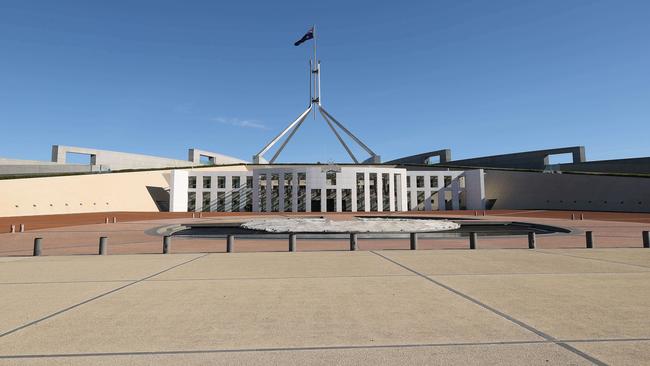Why Australia Day is disrespectful
Many people don’t see anything wrong with celebrating Australia Day on January 26 but this is why they are wrong.
National
Don't miss out on the headlines from National. Followed categories will be added to My News.
It was perhaps inevitable that our national day would be celebrated in summer when we can indulge in all the good things about being Aussie — barbecues, the beach and more than likely, a cold beer.
But there is one thing that’s wrong with this picture — and it’s about what is missing.
Since 1938 some in Australia’s Aboriginal community have been formally protesting against the celebration of January 26, which marks the day Captain Arthur Phillip rowed ashore at Sydney Cove and proclaimed British sovereignty in 1788.
While some early settlers enjoyed celebrating this day, for many Aboriginal people it is seen as a day of mourning and called Invasion Day.
Deakin University professor of interdisciplinary arts Richard Frankland, a Gunditjmara man, said Australia was at a crossroads where it could challenge the date, its symbolism as well as its disrespectful and exclusionary practices.
“We as a nation, and sometimes any nation, acts and celebrates a time of disrespect. We do that because we are socially conditioned,” he told news.com.au.
“What the date signifies for many First Nations people and many Australians, is a war where one side is disregarded,” he said.
“It also signifies massacres, murders, dispossession and ongoing transgenerational trauma.”
January 26 is not a day for celebration – that’s why news.com.au is campaigning to change the date of Australia Day, so we can celebrate the best country in the world, without leaving anyone behind.

Prof Frankland said the First Fleet never landed on Australia because there was no Australia at the time, instead there was a series of First Nations’ nations.
But he said the key reason for changing the date was to enable the country to continue the process of coming together.
“I think we need to change the date, to change the flag and to challenge the identity of our nation,” he said.
“To have the tenacity and courage to aspire to something that’s greater than all of us.
“We create nations not for our own immediate safety, but for the safety of our future, our children and our children to come.”
Former Australian War Memorial director and former defence minister Brendan Nelson has suggested Indigenous people could be honoured with a ceremony at the beginning of Australia Day, to be held a new national resting place for Indigenous remains in Canberra.
While Prof Frankland supported the idea of acknowledgment, he said it should be on a different date.
“I think that where we’re at as a nation is we’re searching for a culture which is beyond the stereotypical culture that we’ve been socially conditioned to believe in,” he said.
“What we’ve begun to do is to challenge the moral bankruptcy of some of our leaders and celebrate leaders advocating for a cultural shift.
“In essence we have to have the courage to recognise the past for what it truly is … to accept the present is a result of the past and inequities and injustice.”

Prof Frankland wants to advance the concept of a “Tomorrow Australia”, which is aimed at people sharing a common vision.
“We have the opportunity to facilitate a great hope for all of us to have a common vision for victory, where nobody is judged on the colour of their skin or heritage, where no one is cast aside or excluded or presented with hurtful symbols,” he said.
“Where people feel safe to practice culture and identity and safe to contribute to a collective voice.
“This can’t happen if we exclude people on the basis of discrimination, if we turn a blind eye to the pain and the anguish that come as a result of horrific acts of the past and current acts of disregard to major issues such as infant mortality, suicide, deaths in custody, chronic illness and greater inequity in discussion about land and resources.”
Prof Frankland said many people in the general population had a far more advanced knowledge of the true history of the country than some of its elected leadership.
“There will be a day when the date will change easily, when the history of these moments will be judged quite harshly by those in the future,” he said.
“This is not a political thing, it’s a humanistic thing.
“The Tomorrow Australia concept should not be seen as a threat, it should be seen as an opportunity for all of us, to get another rung on the ladder towards equity and to advancing us as a nation.
“We have to make sure all of us have some hope.”
Originally published as Why Australia Day is disrespectful



